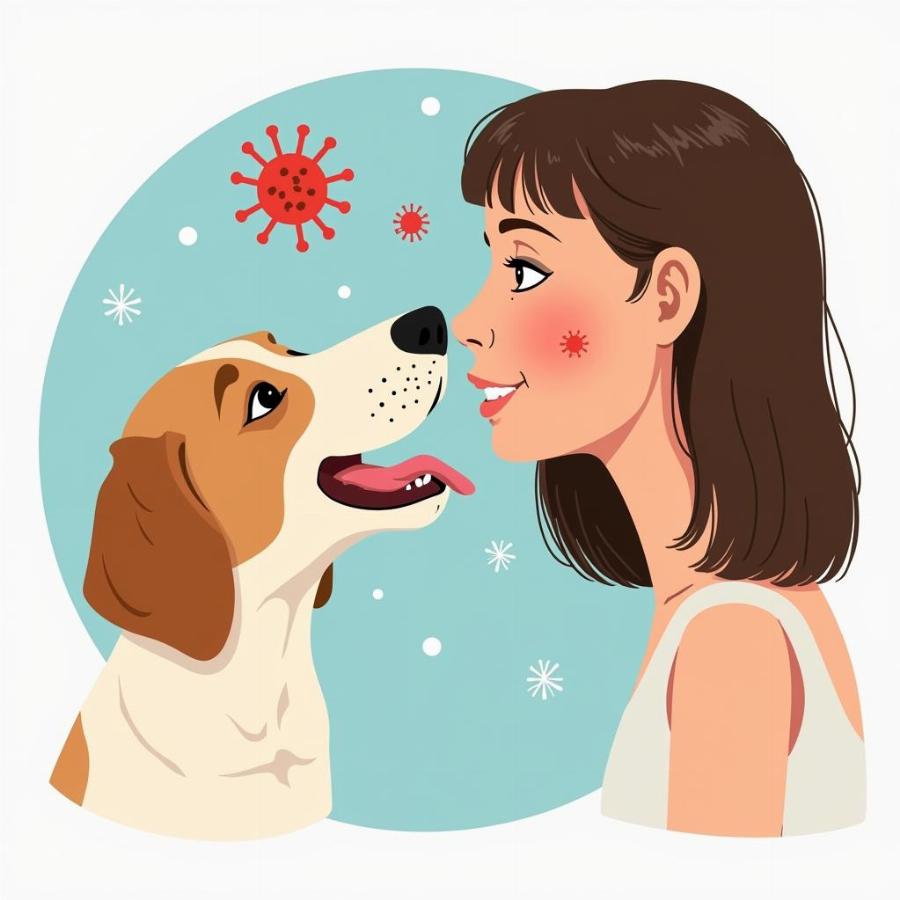The age-old question, “Are dogs’ mouths cleaner than humans?” often pops up in casual conversation. While dog lovers might be quick to defend their furry friends, the truth is a bit more complicated than a simple yes or no. This article dives into the science behind canine oral hygiene, explores the facts, and helps you understand the realities of a dog’s mouth.
Understanding Canine Oral Bacteria
Let’s face it: the idea of a dog’s mouth being inherently cleaner than a human’s is largely a myth. Both humans and dogs have a complex ecosystem of bacteria residing in their mouths. The types of bacteria present, however, differ significantly. While some might argue that a dog’s saliva has antibacterial properties, this doesn’t equate to a sterile environment. In fact, dogs can harbor bacteria that are harmful to both themselves and humans.
 Dog licking face – potential bacterial transfer
Dog licking face – potential bacterial transfer
Factors Affecting Canine Oral Health
Just like in humans, several factors contribute to a dog’s oral health. Diet, genetics, and regular dental care all play a role. A diet rich in dry kibble can help scrape away plaque, while sugary treats can contribute to its buildup. Some breeds are also predisposed to dental issues. Regular brushing with a toothbrush for dogs and using plaque cleaner for dogs are essential for maintaining healthy gums and teeth.
Is a Dog’s Mouth Really “Self-Cleaning”?
The notion that a dog’s mouth is self-cleaning is simply not true. While their saliva does contain some antibacterial enzymes, it’s not enough to combat the constant buildup of plaque and tartar. This is why regular dental care is crucial for preventing periodontal disease, a common and painful condition in dogs. Left untreated, it can lead to tooth loss and even more serious health issues.
The Dangers of Zoonotic Diseases
While the thought of sharing a slobbery kiss with your furry friend is endearing, it’s important to be aware of the potential risks. Dogs can carry bacteria that can be transmitted to humans, causing zoonotic diseases. These infections can range from mild skin irritations to more serious illnesses. Maintaining good oral hygiene for your dog not only benefits their health but also protects yours. You might be wondering, “do dogs have the cleanest mouths?”. The short answer is no, and understanding this can help you take the necessary precautions.
The Importance of Regular Dental Checkups
Regular veterinary dental checkups are as important for your dog as they are for you. A veterinarian can identify early signs of dental disease and recommend appropriate treatment. Professional cleaning under anesthesia is often necessary to remove built-up tartar and plaque below the gum line. This procedure not only improves oral health but can also prevent more serious health problems down the line.
So, Are Dogs’ Mouths Cleaner than Humans?
The short answer is no. While a dog’s saliva might have some antibacterial properties, their mouths are not cleaner than ours. Both humans and dogs have unique oral microbiomes, and both are susceptible to dental diseases. The key takeaway is that regular dental care is essential for both species.
“Regular brushing and professional cleanings are the best way to keep your dog’s mouth healthy and prevent dental disease,” says Dr. Emily Carter, DVM, a veterinary dentist with over 15 years of experience. “Don’t rely on the myth of the self-cleaning dog mouth.”
Dr. Carter also adds, “Dental health is directly linked to overall health. By taking care of your dog’s teeth, you’re contributing to their overall well-being.”
Conclusion
The myth of dogs’ mouths cleaner than humans has been debunked. While dogs’ saliva does contain some antibacterial enzymes, it’s not enough to keep their mouths truly clean. Regular brushing, a healthy diet, and veterinary checkups are crucial for maintaining good oral hygiene in dogs and preventing dental disease. Understanding the facts about canine oral health ensures a happier, healthier life for your furry companion.
FAQs
- How often should I brush my dog’s teeth? Ideally, daily.
- What kind of toothbrush should I use for my dog? A specially designed dog toothbrush with soft bristles.
- What are the signs of dental disease in dogs? Bad breath, red or swollen gums, difficulty chewing.
- Can I use human toothpaste on my dog? No, human toothpaste contains ingredients that are toxic to dogs.
- Are there any dog treats that can help clean their teeth? Yes, dental chews and treats can help remove plaque and tartar.
- How often should my dog have a professional dental cleaning? As recommended by your veterinarian, typically annually.
- Can dental disease in dogs affect their overall health? Yes, it can lead to heart, kidney, and liver problems.
Further Reading
Beaut Dogs is your one-stop resource for all things canine, offering expert advice and valuable insights into the world of dog ownership. From breed information to health and training tips, we’re dedicated to helping you provide the best care for your furry companion. When you need assistance, email us at [email protected] for detailed and accurate answers. Visit Beaut Dogs today and discover the wonderful world of dog care!